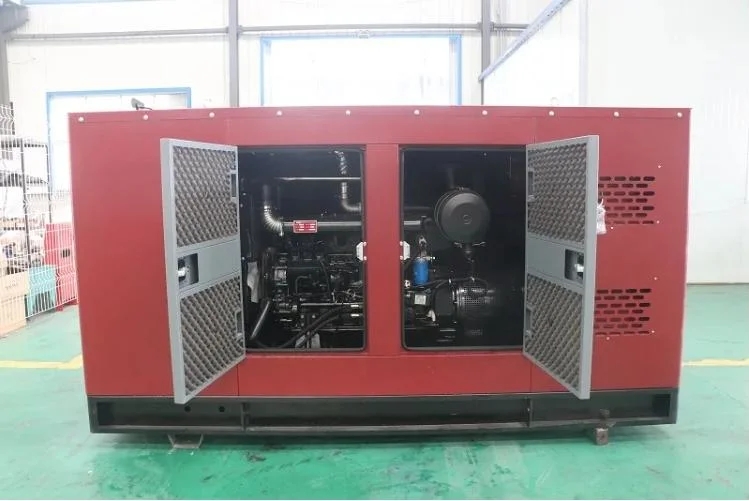Introduction:
In today's rapidly evolving world, the demand for reliable and efficient power generation solutions is more critical than ever. Diesel generators have long been a popular choice for providing backup power in situations where grid electricity is unavailable or unreliable. One of the key challenges faced by diesel generators is their ability to efficiently handle variable load demands. In this article, we will explore the intricacies of optimizing diesel generators for variable load demands, discussing the underlying principles, challenges, and best practices for achieving maximum efficiency and reliability.
Understanding useful link :
Variable load demands refer to situations where the power requirements fluctuate over time. This can occur due to a variety of factors, such as changes in weather conditions, operational shifts in industrial settings, or fluctuations in power consumption patterns. Diesel generators are typically designed to operate optimally at a constant load, and significant variations in load can impact their overall performance and efficiency.
Challenges Faced by Diesel Generators in Handling Variable Loads:
Diesel generators face several challenges when it comes to effectively managing variable load demands. One of the primary issues is related to fuel consumption and efficiency. Diesel engines are most efficient when operating at or near their rated load capacity. Operating at loads significantly lower or higher than the rated capacity can lead to inefficient fuel combustion, increased emissions, and premature wear and tear on engine components.
Another challenge is related to the response time of diesel generators to sudden changes in load. Diesel engines have a slower response time compared to other power generation technologies, such as gas turbines or battery storage systems. This lag in response can result in voltage and frequency fluctuations, leading to potential disruptions in the power supply.
Optimizing Diesel Generators for Variable Load Demands:
Despite the challenges posed by variable load demands, there are several strategies that can be employed to optimize diesel generators for efficient operation. These strategies involve a combination of technical solutions, operational practices, and maintenance procedures aimed at enhancing the performance and reliability of diesel generators under varying load conditions.
1. Right-sizing the Generator:
One of the fundamental principles in optimizing diesel generators for variable load demands is to right-size the generator based on the expected load profile. Oversized generators operating at low loads can experience efficiency losses and increased maintenance costs. On the other hand, undersized generators may struggle to meet peak demand requirements. Conducting a thorough load analysis and selecting a generator that matches the anticipated load variations is essential for maximizing efficiency and performance.
2. Load Management Systems:
Implementing load management systems can help regulate the power output of diesel generators in response to changing load conditions. These systems utilize advanced controls and monitoring technologies to adjust the generator's operation based on real-time load data. By dynamically matching the generator output to the actual load demand, load management systems can improve fuel efficiency, reduce emissions, and enhance overall system reliability.

3. Variable Speed Generators:
Variable speed generators offer a flexible solution for handling variable load demands more effectively. Unlike fixed-speed generators, which operate at a constant speed regardless of the load, variable speed generators can adjust their engine speed to match the required power output. This dynamic response enables variable speed generators to operate more efficiently across a wide range of load conditions, leading to fuel savings and reduced emissions.
4. Load Testing and Maintenance:
Regular load testing and maintenance are essential for ensuring the optimal performance of diesel generators under variable load demands. Load testing involves subjecting the generator to varying load conditions to assess its response time, stability, and efficiency. Identifying and addressing any operational issues through proactive maintenance measures, such as fuel system checks, oil analysis, and engine tuning, can help prevent potential breakdowns and prolong the lifespan of the generator.
5. Fuel Quality and Efficiency:
The quality of fuel used in diesel generators plays a crucial role in their performance under variable load demands. Contaminated or low-quality fuel can lead to combustion issues, reduced efficiency, and increased emissions. Regular fuel quality testing, filtration, and storage practices are essential for maintaining the optimal performance of diesel generators. Additionally, adopting fuel-efficient technologies, such as electronic fuel injection systems and advanced combustion controls, can further enhance the efficiency of diesel generators under variable load conditions.
Conclusion:
Optimizing diesel generators for variable load demands requires a multifaceted approach that combines technical expertise, operational strategies, and maintenance best practices. By understanding the challenges associated with variable load demands and implementing the right solutions, operators can enhance the efficiency, reliability, and performance of diesel generators in diverse applications. With the increasing emphasis on sustainability and energy efficiency, the optimization of diesel generators for variable load demands is essential for meeting the evolving power generation needs of today and tomorrow.
